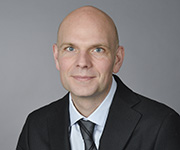Curriculum Vitae

Geschäftsführender Oberarzt
Leitung AG Systemische Neurowissenschaften
Facharzt für Psychiatrie und Psychotherapie
06131 17 7336 (Direktionssekretariat)
06131 229974Weitere Informationen
Positions and functions:
- Managing senior physician
- Head of AG Systemic Neurosciences
University training and degrees
2019 Habilitation in Psychiatry and Psychotherapy, Heidelberg University
2018 Master of Business Administration, Mannheim University
2016 Board Certification in Psychiatry and Psychotherapy
2004 Doctoral degree „summa cum laude" (Dept. of Physiology), Heidelberg University
1999 – 2002 Graduate Program in Cellular and Molecular Neurosciences, Heidelberg University
1996 – 2003 Studies in Medicine, Medical Faculty Heidelberg of Heidelberg University, Paris 6, University College London
Postgraduate professional Career
2019 – Professor for Systemic Neuroscience and Lead Attending, Dept. Of Psychiatry and Psychotherapy, University Hospital Mainz
2017 – 2019 Staff Psychiatrist and Group leader, Central Institute of Mental Health, Heidelberg University
2011 – 2017 DFG Emmy-Noether Research Group, Central Institute of Mental Health, Heidelberg University
2008 – 2010 Dept. of Clinical Neurobiology, German Cancer Research Center and Heidelberg University (Prof. Hannah Monyer)
2008 – 2016 Dept. of Psychiatry and Psychotherapy, Central Institute of Mental Health and Dept. of Neurology, UMM, Heidelberg University
2005 – 2008 Postdoctoral fellow, Dept. of Brain and Cognitive Science, Massachusetts Institute of Technology, Cambridge, MA, USA (Prof. Carlos Lois)
2004 – 2005 Clinic for Psychiatry and Psychotherapy, Max-Planck-Institute of Psychiatry, Munich (Prof. Florian Holsboer)
Other professional activities or honors
2015 – 2018 Travel fellowship A.-v.-H. Foundation and Chinese Academy of Science
2014 – 2015 Chica and Heinz Schaller Fellowship
2008 – 2010 Fellowship of the Medical Faculty Heidelberg
2005 – 2008 Paul E. Newton Grant Fellowship
2004 – 2005 Fellowship Max Planck Society
1999 – 2003 Studienstiftung des Deutschen Volkes
Selected publications (10 best publications)
1. Oettl LL, Scheller M, Filosa C, Wieland S, Haag F, Loeb C, Durstewitz D, Shusterman R, Russo E, Kelsch W (2020) Phasic dopamine reinforces distinct striatal stimulus encoding in the olfactory tubercle driving dopaminergic reward prediction. Nat Comm 11:3460.
2. Clemm von Hohenberg C, Weber-Fahr W, Lebhardt P, Ravi N, Braun U, Gass N, Becker R, Sack M, Cosa Linan A, Gerchen MF, Reinwald JR, Oettl LL, Meyer-Lindenberg A, Vollmayr B, Kelsch W*, Sarto-rius A* (2018) Lateral habenula perturbation reduces default-mode network connectivity in a rat model of depression. Transl Psychiatry 8:68. (*shared last authorship)
3. Oettl LL, Ravi R, Schneider M, Scheller M, Schneider P, Mitre M, Froemke RC, Chao MV, Young WS, Meyer-Lindenberg A, Grinevich V, Shusterman, Kelsch W (2016) Oxytocin enhances social recognition by modulating cortical control of early olfactory processing. Neuron 90:609-21. (Preview: Ron Stoop (2016) Sniffing and Oxytocin: Effects on Olfactory Memories. Neuron 90:431-3)
4. Wieland S, Schindler S, Huber C, Köhr G, Oswald MJ, Kelsch W (2015) Phasic Dopamine Modifies Sensory-Driven Output of Striatal Neurons through Synaptic Plasticity. J Neurosci 35:9946-56.
5. Wieland S, Dan D, Oswald M, Parlato R, Köhr G, Kelsch W (2014) Phasic Dopaminergic activity exert fast control of cholinergic interneuron firing by sequential NMDA, D2 and D1 receptor activation. J Neu-rosci 34:11549-59.
6. Lin, CW, Sim S, Ainsworth A, Okada M, Kelsch W, Lois C (2010). Genetically increased cell-intrinsic excitability enhances neuronal integration into adult brain circuits. Neuron 65, 32–39.
7. Kelsch W, Sim S, Lois C (2010) Watching Synaptogenesis in the Adult Brain. Ann Rev Neurosci 33:131- 149.
8. Kelsch W, Lin CW, Lois C (2008) Sequential development of synapses in dendritic domains during adult neurogenesis. PNAS 105:16803-16808.
9. Kelsch W, Mosley CP, Lin CW, Lois C (2007) Distinct mammalian precursors are committed to generate neurons with defined dendritic projection patterns. PLoS Biol 5:1201-1212.
10. Kelsch W, Hormuzdi S, Straube E, Lewen A, Monyer H, Misgeld U (2001). Insulin-like growth factor 1 and a cytosolic tyrosine kinase activate chloride outward transport during maturation of hippocampal neu-rons. J Neurosci 21, 8339–8347.


 English
English